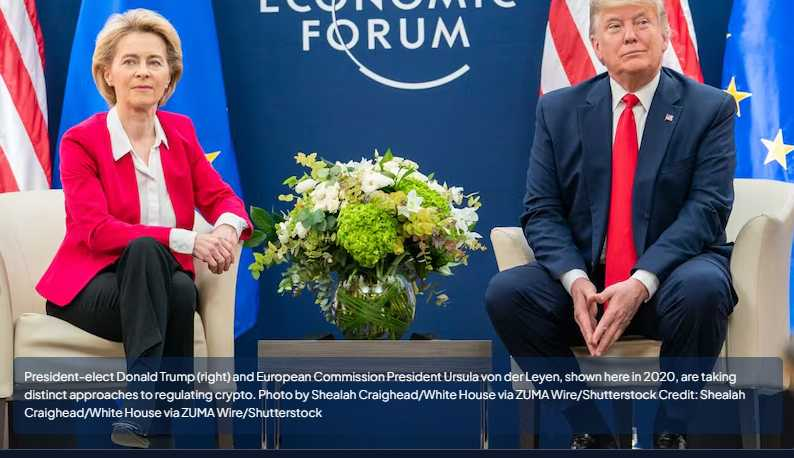- A new president and Congress will flip crypto regulation back to the US from Brussels.
- A freewheeling US approach will contrast with the European Union's prescriptive model.
- Trump isn't just a crypto supporter — he's a player.
Howdy. Ed here. In just the last few weeks, the crypto regulatory story has been turned on its head.
“Regulation by enforcement” is dead. And the industry’s wish list is very much alive.
Crypto, which raised almost $200 million to influence the 2024 US election, is poised to land its holy grail — a bespoke law that codifies cryptocurrencies as assets separate from stocks, bonds, and other securities.
Even better, the incoming Trump Administration appears content to let crypto be crypto.
Donald Trump and his sons, after all, aren’t just supporters, they’re also players.
Their newly minted crypto venture, World Liberty Financial, promises to lead a revolution “by dismantling the stranglehold of traditional financial institutions.”
In other words, let the disruption rip.
A question of clarity
A year ago, all the crypto industry wanted was clarity.
Rather than acquiesce to the industry’s desire for legislation that treated cryptocurrencies as a separate asset class, the US Securities and Exchange Commission insisted on applying laws passed during the 1930s to the fledgling marketplace.
That meant a lot of very messy, and costly, litigation.
Crypto leaders such as Coinbase CEO Brian Armstrong cried foul and rang the alarm about US competitiveness.
Amid the tumult, it was the European Union that offered hope.
Here comes MiCA
With the 2023 passage of the landmark Markets in Crypto-Assets Regulation, or MiCA, the 27-nation bloc clarified the do’s and don’ts for an industry bristling at Gary Gensler’s crackdown.
Crypto giants such as Coinbase and Circle may not have jumped for joy as Brussels imposed fresh regulations in the world’s second biggest economic area.
But they did welcome an approach that eschewed Gensler’s taste for legal combat in favour of clearly drawn rules.
But now, with the advent of Trump’s second term and a Republican Congress, all bets are off.
It will be Washington that resets the regulatory agenda for an industry that has added $1.2 trillion in market value since election day on November 5.
If crypto champions such as Senator Cynthia Lummis, a Wyoming Republican, introduce legislation that memorialises the industry’s exceptionalism in law, MiCA is going to look downright thorny by comparison.
Detailed blueprints
This is because when it comes to regulating technology, the US tends to err on the side of letting businesses do what they want. If companies do run afoul of the law, well, that’s what the courts are for.
In contrast, the EU prefers a preemptive and prescriptive approach to regulation. This is why MiCA lays out detailed blueprints for everything from stablecoins to crypto exchanges to NFTs.
Now the US is about to pitch up a more freewheeling alternative regime. Some officials say it’s high time.
‘Brutish and short’
In a speech earlier this month, Hester Peirce, the crypto-supporting SEC commissioner, urged her fellow regulators to stop clutching their pearls at the mere mention of crypto.
“Crypto-asset skeptics and enthusiasts alike can understand that a regulatory environment that is characterised by instability, uncertainty, and fear inevitably renders entrepreneurial prospects nasty, brutish, and short,” Peirce said.
As a new era dawns, crypto entrepreneurs won’t have regulators to kick around anymore.
They’ll already have what they want.












 All while Pfizer—a company with a $2.3 billion criminal fine for fraudulent marketing, bribery, and kickbacks—was given blanket immunity from liability and billions in taxpayer dollars to produce a vaccine in record time with no long-term safety data.
All while Pfizer—a company with a $2.3 billion criminal fine for fraudulent marketing, bribery, and kickbacks—was given blanket immunity from liability and billions in taxpayer dollars to produce a vaccine in record time with no long-term safety data.
























